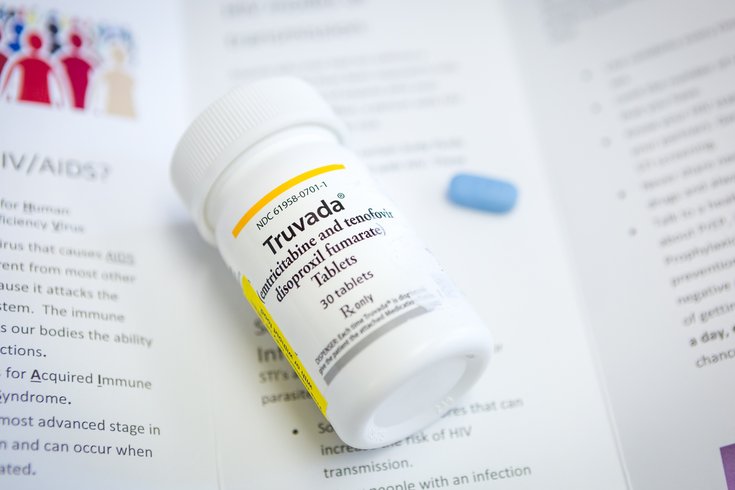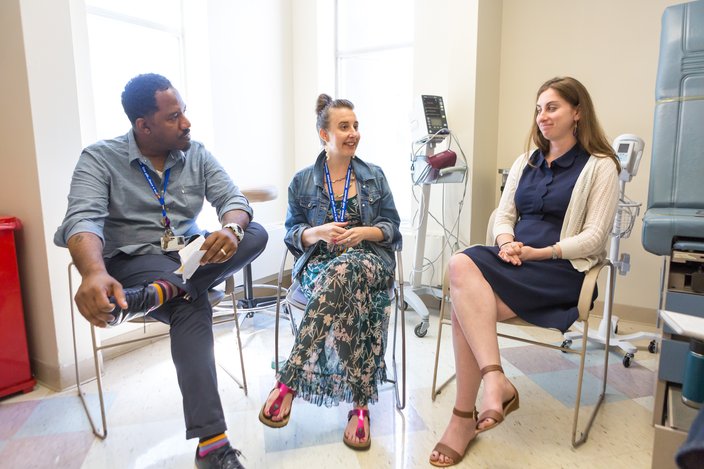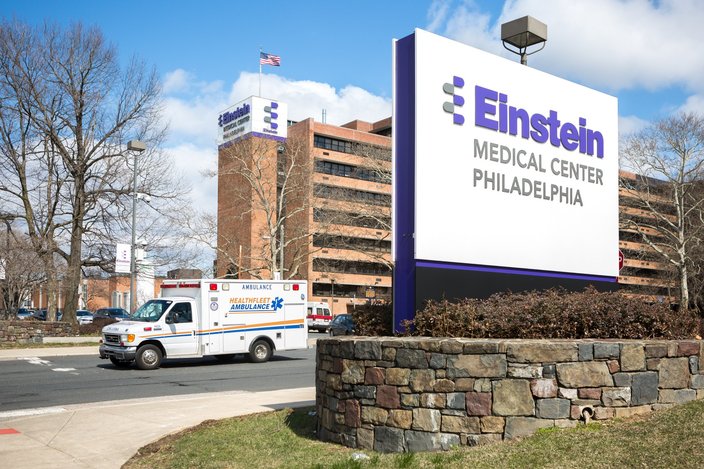
June 22, 2018
 Thom Carroll/PhillyVoice
Thom Carroll/PhillyVoice
Truvada is a drug that can reduce the risk of an HIV infection.
A medication proven to prevent HIV has been available in the United States for six years.
Yet, awareness of PrEP – short for pre-exposure prophylaxis – has remained minimal in some of the Philadelphia neighborhoods where HIV is most prevalent.
When Einstein Healthcare's Immunodeficiency Center ramped up HIV testing three years ago, medical professionals realized many patients did not know whether they were taking the appropriate precautions to prevent HIV.
They had virtually no knowledge of PrEP, a preventative drug sold under the brand name Truvada, either.
"We knew that this little blue pill was sitting around and they didn't know anything about it," said John Rose, a community linkage and prevention coordinator at Einstein. "We thought to ourselves, it was the next logical step to have me in the community."
Backed by a pair of new grants, Einstein launched an enhanced HIV prevention program that emphasizes community outreach while also educating clinicians and staff within the Einstein network.
Rather than simply operating a PrEP clinic, the program seeks to integrate HIV prevention – and PrEP – into Einstein's primary healthcare services, a move that should broaden awareness of the drug.
The program particularly seeks to improve community awareness in the North Philly neighborhoods that surround Einstein Medical Center – areas that have some of the highest HIV rates in the city.
"We don't want to just wait for people who come into Einstein's doors," HIV Program Director Aviva Joffe said. "We want to get out into the community and educate and inform."
Some 153,000 U.S. adults received prescriptions for PrEP last year, according to Gilead Sciences, the pharmaceutical company that manufactures Truvada.
Previous analyses released by Gilead revealed that nearly 75 percent of PrEP users are white men age 25 and older. That means that many of the people most vulnerable to HIV – particularly women, young people and gay, black men – are not receiving prescriptions.
"The minority of new infections in Philadelphia are white, yet the majority of people taking PrEP are white," Joffe said. "In the zip codes where we are, in the population where we are, we're viewing this as a racial justice issue."
Of the 10 Philadelphia zip codes with the highest HIV prevalence rates, five are located in North Philly, according to AIDSVu.org, which maps HIV prevalence rates across the United States.
The vast majority of the people living in those zip codes – 19121, 19132, 19133, 19140 and 19144 – identify as black or Hispanic, according to the U.S. Census Bureau. Nearly 45 percent of the residents live below the poverty line.
In Philadelphia, the number of newly-diagnosed HIV cases has dropped for at least five straight years, according to the latest HIV Surveillance Report issued by the city. The rates of infection are far higher among black and Hispanic people than whites.
Hispanic people had the highest rate of new HIV diagnoses in 2016, at 49.8 per 100,000 people. Non-Hispanic blacks had nearly the same rate, at 48.9 per 100,000 people. Non-Hispanic whites were diagnosed at 11.4 per 100,000 people.
Prior to launching its new HIV PrEP outreach efforts in January, Einstein's immunodeficiency center had prescribed PrEP to about 10 people consistently during the previous five years, Joffe said. Since March, the center has prescribed PrEP to an additional 35 individuals.
"We're trying to meet ... the most vulnerable, or in need, and those are people who aren't coming to the medical establishment and often – and rightly, so – may not have trust in the medical establishment," Joffe said. "We also are really viewing this from a lens of social or racial justice. I think that's an important part."
John Rose, community linkage and prevention coordinator; Laura Martindale, prevention coordinator, and Aviva Joffe, program director of Einstein Healthcare's Immunodeficiency Center, discuss PrEP, an HIV prevention drug.
That's where Rose enters the picture.
Rose has spent much of his time building relationships within the North Philly neighborhoods surrounding Einstein, seeking to inform community stakeholders – and the residents themselves – about PrEP.
As part of his outreach, Rose has visited churches, hair salons, barbershops and retail outlets. Einstein is also in the process of partnering with two local libraries.
At times, Rose has conducted hour-long slideshow presentations which outline the epidemiology of HIV and the prevelance rates throughout the community. He's looking to host many more.
"It's significant, because some people interact with the medical world infrequently," Rose said. "So, they're not always getting these messages where they are. This bridges that gap."
But, it's not always easy.
Sometimes, people are suspicious of PrEP, wondering whether it will make them sick or if it is part of some sort of medical experiment. Such perceptions, Rose said, emanate from previous medical injustices communities of color have faced.
Other times, people simply don't perceive themselves to be at risk.
"When we show the prevalence rates in (their) zip codes, and we explain to people that the numbers stack up like that – that puts you at higher risk just because you live in that area," Rose said. "People begin to connect the dots – 'Wow, this could be me. This could be my partner.' They start to understand."
Rose also has sought to dispel the notion that taking PrEP means a person is living a promiscuous lifestyle.
"People don't have the concept that it's a preventative measure, very much like birth control," Rose said. "It should be viewed that way. ... Every time we hear things like that – that's the purpose of us being in the community. They're myths and they're misinformation. They're damaging."
Einstein's Immunodeficiency Center is ramping up its outreach of PrEP, an HIV prevention drug.
When taken daily, PrEP reduces a user's chances of contracting HIV through sex by 90 percent. When used with a condom, which Einstein medical professionals recommend, the risk of contracting HIV diminishes even more.
The Centers for Disease Control and Prevention recommends PrEP for people who are HIV-negative and in an ongoing relationship with a partner who is HIV-positive.
The CDC also recommends PrEP for people who are not in a mutually monogamous relationship with a partner who recently tested HIV-negative and is either a heterosexual person who does not regularly use condoms during sex with partners of unknown HIV status, or is a gay or bixsexual man who has had condomless anal sex or been diagnosed with a sexually-transmitted infection in the last six months.
"Pretty much, it's anybody that is having condomless sex," Einstein prevention coordinator Laura Martindale said. "People having condomless sex are at risk. People who have sexually-transmitted infection are at risk."
Additionally, PrEP is recommended for people who inject drugs and share needles, though it only reduces the risk of contracting HIV by 70 percent.
Taking PrEP requires regular medical checkups, Martindale said. Every three months, doctors want to ensure the medication is working properly and check for exposure to any other sexually-transmitted infections.
Though expensive – PrEP costs about $1,000 per month – most insurance companies cover Truvada, because it is a preventative drug. Martindale said Medicaid completely covers PrEP, and Gilead runs an assistance program for the uninsured.
"We are really working hard to integrate prevention in primary health care," Martindale said of Einstein's HIV prevention program. "Conversations around sexual health and wellness are the key to identifying most of the candidates."
Though more than 150,000 Americans have been prescribed PrEP since the U.S. Food and Drug Administration approved Truvada in July 2012, a CDC study found that more than a million Americans could benefit from the medication.
Still, Gilead has only now begun building a significant advertising campaign for Truvada.
The pharmaceutical company is rolling out its first television advertisements for Truvada, which the company states are "designed to encourage candid conversations around sexual health and promote public awareness of HIV prevention."
Medical professionals anticipate that those commercials will result in greater awareness.
"I think direct-to-consumer advertising is going to make a difference," said Dr. Helen Koenig, the medical director Philadelphia FIGHT's PrEP program. "We know that direct-to-consumer advertising makes a difference in all other fields. I think it will in this one as well."
Einstein's HIV prevention program is far from the only like-minded effort happening in Philadelphia.
Philadelphia FIGHT was the first health-services organization to launch a PrEP program in the city.
The organization, which primarily serves people living with HIV/AIDS, offers PrEP throughout its various locations. It has also partnered with Walgreens to host pop-up PrEP clinics.
"We're not going to have a cure or a vaccine forever, unfortunately," Koenig said. "We're several decades out from those kinds of things. I think we're all realizing that PrEP is the only way to end the epidemic in the near future, or work toward that goal."
Expanding the number of primary care practices ready to prescribe PrEP – as is happening at Einstein – is a critical step, Koenig said. That's the best setting to identify candidates who could benefit from the medication.
"When you're talking to your patients about family planning and birth control, PrEP is one of those things we should talk about as a wellness assessment," said Koenig, who also is a Penn Medicine physician specializing in infectious diseases.
Ultimately, Koenig said, that needs to expand into pediatrics, where issues of parental consent have slowed its availability.
"We're reaching people too late," Koenig said. "The fastest growing age group, in terms of HIV infection, is youth – young adults ages 13 to 24."
Other demographics could benefit from more outreach, too.
At this point, PrEP is mostly being consumed by white, gay men – particularly those who are educated and in their 30s and 40s, Koenig said.
"MSM (men who have sex with men), in general, still comprise 70 percent of our new HIV infections every year, but we're missing people of color," Koenig said. "The biggest mismatch is that most new infections are among people of color. But that's not where most of the PrEP is."
 Thom Carroll/PhillyVoice
Thom Carroll/PhillyVoice Thom Carroll/PhillyVoice
Thom Carroll/PhillyVoice